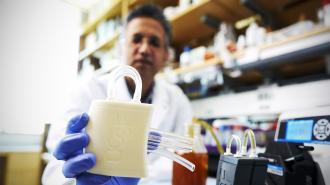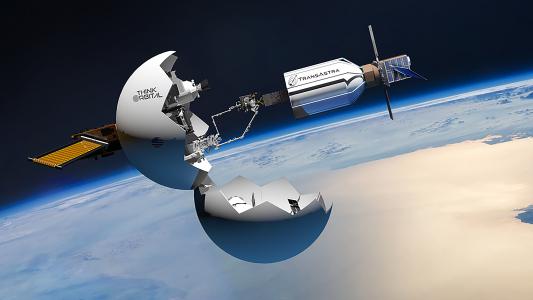Researchers at the Kidney Project just got a major step closer to their goal of creating an artificial kidney, demonstrating that a proof-of-concept device could keep kidney cells alive and functional in pigs for at least a week.
The challenge: More than 800,000 people in the US are living with kidney failure, meaning their kidneys can no longer sufficiently remove waste from their body and ensure their blood contains the proper balance of salt, water, and other chemicals. If left untreated, this will lead to death.
There aren’t enough donor kidneys for everyone experiencing kidney failure.
To avoid that, people with kidney failure undergo dialysis, where a machine filters their blood for them, usually at a healthcare clinic. Because this takes three to four hours and has to be done three times a week, it is a significant burden on day-to-day life.
Even with dialysis, life expectancy is significantly shortened. With a kidney transplant, patients can expect to live 10 to 15 years longer.
The problem is that there aren’t enough donor kidneys to meet demand. If a person is lucky enough to find a matching donor, they still have to take immunosuppressants for the rest of their lives. While the drugs ensure their body won’t reject the organ, they also increase the risk of serious infections.
“We are focused on safely replicating the key functions of a kidney.”
Shuvo Roy
An artificial kidney: Researchers at the Kidney Project are on a quest to create a device that could be permanently implanted to do the job of a healthy kidney constantly and automatically.
This artificial kidney could end the need for dialysis and, if it works well enough, kidney transplants.
“We are focused on safely replicating the key functions of a kidney,” said Shuvo Roy, the Kidney Project’s technical director. “The bioartificial kidney will make treatment for kidney disease more effective and also much more tolerable and comfortable.”
What’s new? The Kidney Project has hit a major milestone in the development of its artificial kidney, demonstrating that kidney cells housed in their device can not only survive in pigs, but also perform essential kidney functions — without triggering an immune reaction.
“We needed to prove that a functional bioreactor will not require immunosuppressant drugs, and we did,” said Roy, a bioengineering professor at UC San Francisco.
At the end of the 7-day trial, more than 90% of the cells were still viable and functional.
The trial: At the core of the artificial kidney prototype is a rectangular bioreactor designed to provide the ideal environment for kidney cells — for this study, the cells were proximal tubule cells, which regulate salt and water in the blood.
Blood entered and exited the bioreactor through tubes connected to the pigs’ blood vessels. This provided the kidney cells with the oxygen and nutrients they needed to survive, while silicon nanopore membranes developed by Roy kept them safe from the pigs’ immune system.
At the end of the 7-day trial, more than 90% of the cells were still viable and functional.
Looking ahead: The prototype used in the pig study couldn’t replace a natural kidney, as it contained just one type of kidney cell and lacked a waste-filtering component — one of the most crucial kidney functions. The finished design will need to include a variety of cell types, as well as a device to clean the blood.
Still, it serves as a proof-of-concept that Roy’s silicon membranes can effectively prevent a recipient’s immune system from attacking the cells in an artificial kidney and that the device could keep the majority of the cells alive and functioning for a week.
The researchers now plan to move forward with month-long trials in pigs, with the hope that human trials will soon be on the horizon.
The big picture: The pursuit of a cure for kidney failure is taking off; other teams are regenerating damaged kidneys in mice, transplanting gene-edited pig kidneys into people, and using stem cells to eliminate the need for immunosuppression.
With the progress building for an artificial kidney, we may be heading toward a future where kidney failure is a curable disease for everyone, without dialysis or immunosuppressants.
We’d love to hear from you! If you have a comment about this article or if you have a tip for a future Freethink story, please email us at [email protected].






